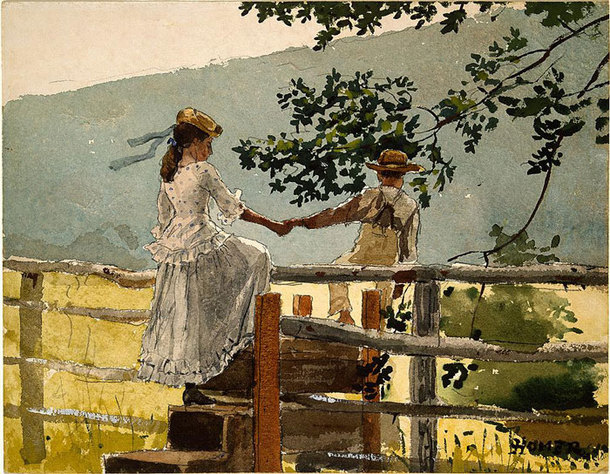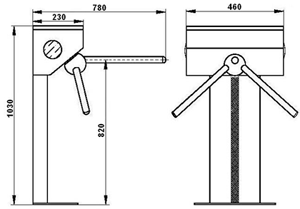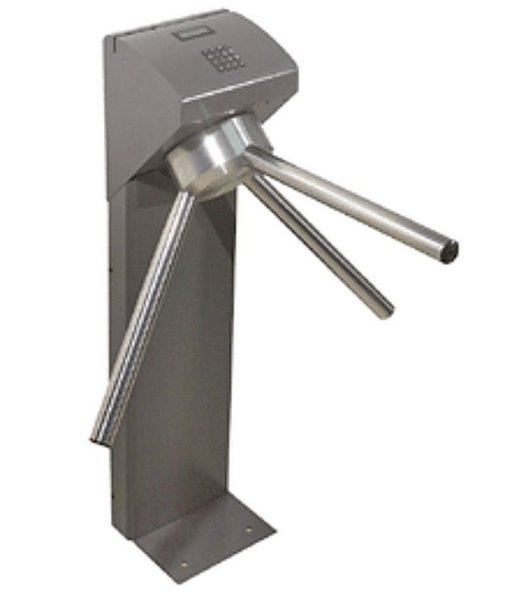ターンスタイル(回り木戸) Turnstile [モノ things]
時間が(11月から)空きすぎて自分でもなんだか主旨がわからなくなった書きかけの記事を〆ておきます。
(承前)〔ポーの「悪魔に首を賭けるな」がらみのはなし〕
ある晴れた日に足の向くまま散歩していた語り手とトビー・ダミットは有蓋橋を渡ることに決めます(resolved というのは、タダでは渡れないからなのかしら)。
One fine day, having strolled out together, arm in arm, our route led us in the direction of a river. There was a bridge, and we resolved to cross it. It was roofed over, by way of protection from the weather, and the arch-way, having but few windows, was thus very uncomfortably dark. As we entered the passage, the contrast between the external glare, and the interior gloom, struck heavily upon my spirits. (Edgar Allan Poe, "Never Bet the Devil Your Head," Mabbott 2: 626) 〔ある晴れた日、腕を組んで一緒にそぞろ歩いた僕たちだが、道は川の方向にむかっていた。橋があったので、渡ることに決めた。橋には、風雨を防ぐために屋根がすっぽりかかっていて、窓もほとんどない通路は気分が悪いくらい暗かった。入ったとたんに、外の明るさに比べて中の陰鬱が僕の気を重たく滅入らせた。〕
At length, having passed nearly across the bridge, we approached the termination of the foot-way, when our progress was impeded by a turnstile of some height. Through this I made my way quietly, pushing it around as usual. But this turn would not serve the turn of Mr. Dummit. He insisted upon leaping the stile, and said he could cut a pigeon-wing over it in the air. (とうとう橋を渡り終えかけたところで、歩道が尽きて、僕たちはちょっと高い回転木戸があったので進行をさまたげられた。僕はいつものように木戸を押して回して、静かに通り抜けた。けれどもこういう回転ではダミット氏の順番〔回転〕はすまなかった。木戸の上を跳ぶと言い張り、空中で両脚を合わせる芸当をやってみせると言った。)

Winslow Homer, On the Stile (c. 1878) watercolor, gouache, and graphite on paper, Collection of Mr. and Mrs. Paul Mellon
image: National Gallery of Art (Washington DC) <http://www.nga.gov/feature/homer/homer13.htm>
.jpg)
J[ames] A. Jenney, Girl at Turnstile (Mackinac Island, Michigan 19世紀後半)
image via Wikimedia Commons <http://commons.wikimedia.org/wiki/File:Girl_at_turnstile,_by_Jenney,_J._A._(James_A.).png>; originally NPYL Digital Gallery <http://digitalgallery.nypl.org/nypldigital/dgkeysearchdetail.cfm?strucID=622344&imageID=G90F409_012ZF>

Tripod turnstile, column-type [Finishing: arms - stainless steel,
support - enamel varnish/stainless steel; control board;
Power supply: 12VDC / 2A; Space for accumulator battery: 12V / 7Ah;
Dimensions: 1030 x 800 x 460mm
image: BulgarianIndustry <http://www.bulgarianindustry.bg/en/products?product=505632699977336006>

image: Katalog Produk: turnstile (akses pintu masuk) - SEPAKAT RAYA - Indonesia <http://medan.indonetwork.co.id/sepakat_raya/1787674/turnstile-akses-pintu-masuk.htm>
Upon observing him more closely, I perceived that he wore a black silk apron over his small-clothes; and this was a thing which I thought very odd. Before I had time to make any remark, however, upon so singular a circumstance, he interrupted me with a second "ahem!"
To this observation I was not immediately prepared to reply. The fact is, remarks of this laconic nature are nearly unanswerable. I have known a Quarterly Review non-plussed by the word "Fudge!" I am not ashamed to say, therefore, that I turned to Mr. Dammit for assistance.
"Dammit," said I, "what are you about? don't you hear?―the gentleman says 'ahem!'" I looked sternly at my friend while I thus addressed him; for, to say the truth, I felt particularly puzzled, and when a man is particularly puzzled he must knit his brows and look savage, or else he is pretty sure to look like a fool.
"Dammit," observed I-although this sounded very much like an oath, than which nothing was further from my thoughts-"Dammit," I suggested―"the gentleman says 'ahem!'"
I do not attempt to defend my remark on the score of profundity; I did not think it profound myself; but I have noticed that the effect of our speeches is not always proportionate with their importance in our own eyes; and if I had shot Mr. D. through and through with a Paixhan bomb, or knocked him in the head with the "Poets and Poetry of America," he could hardly have been more discomfited than when I addressed him with those simple words: "Dammit, what are you about?― don't you hear?―the gentleman says 'ahem!'"
"You don't say so?" gasped he at length, after turning more colors than a pirate runs up, one after the other, when chased by a man-of-war. "Are you quite sure he said that? Well, at all events I am in for it now, and may as well put a bold face upon the matter. Here goes, then-ahem!"
At this the little old gentleman seemed pleased-God only knows why. He left his station at the nook of the bridge, limped forward with a gracious air, took Dammit by the hand and shook it cordially, looking all the while straight up in his face with an air of the most unadulterated benignity which it is possible for the mind of man to imagine.
"I am quite sure you will win it, Dammit," said he, with the frankest of all smiles, "but we are obliged to have a trial, you know, for the sake of mere form."
"Ahem!" replied my friend, taking off his coat, with a deep sigh, tying a pocket-handkerchief around his waist, and producing an unaccountable alteration in his countenance by twisting up his eyes and bringing down the corners of his mouth―"ahem!" And "ahem!" said he again, after a pause; and not another word more than "ahem!" did I ever know him to say after that. "Aha!" thought I, without expressing myself aloud―"this is quite a remarkable silence on the part of Toby Dammit, and is no doubt a consequence of his verbosity upon a previous occasion. One extreme induces another. I wonder if he has forgotten the many unanswerable questions which he propounded to me so fluently on the day when I gave him my last lecture? At all events, he is cured of the transcendentals."
"Ahem!" here replied Toby, just as if he had been reading my thoughts, and looking like a very old sheep in a revery.
The old gentleman now took him by the arm, and led him more into the shade of the bridge―a few paces back from the turnstile. "My good fellow," said he, "I make it a point of conscience to allow you this much run. Wait here, till I take my place by the stile, so that I may see whether you go over it handsomely, and transcendentally, and don't omit any flourishes of the pigeon-wing. A mere form, you know. I will say 'one, two, three, and away.' Mind you, start at the word 'away.'" Here he took his position by the stile, paused a moment as if in profound reflection, then looked up and, I thought, smiled very slightly, then tightened the strings of his apron, then took a long look at Dammit, and finally gave the word as agreed upon―
One-two-three-and-away!
///////////////////////////////




モカ さま、はじめまして。どうもご訪問&Niceありがとうございます。
by morichanの父 (2011-02-25 10:59)
kaoru さん、ご訪問ありがとうございます。
by morichanの父 (2011-02-26 17:20)